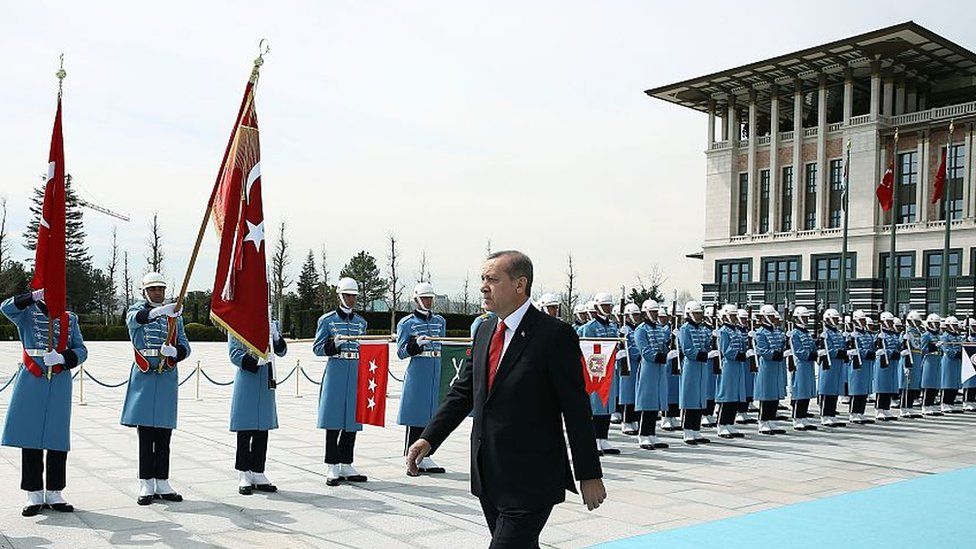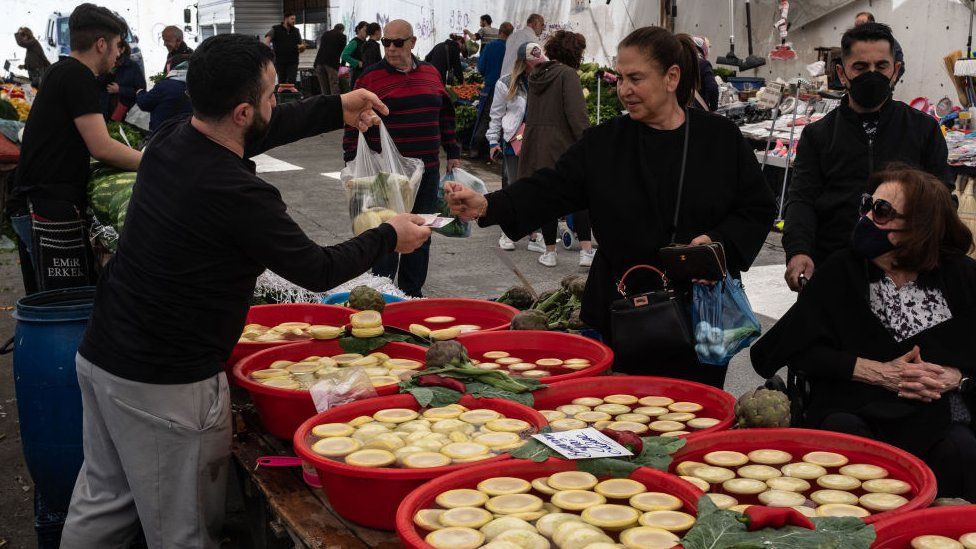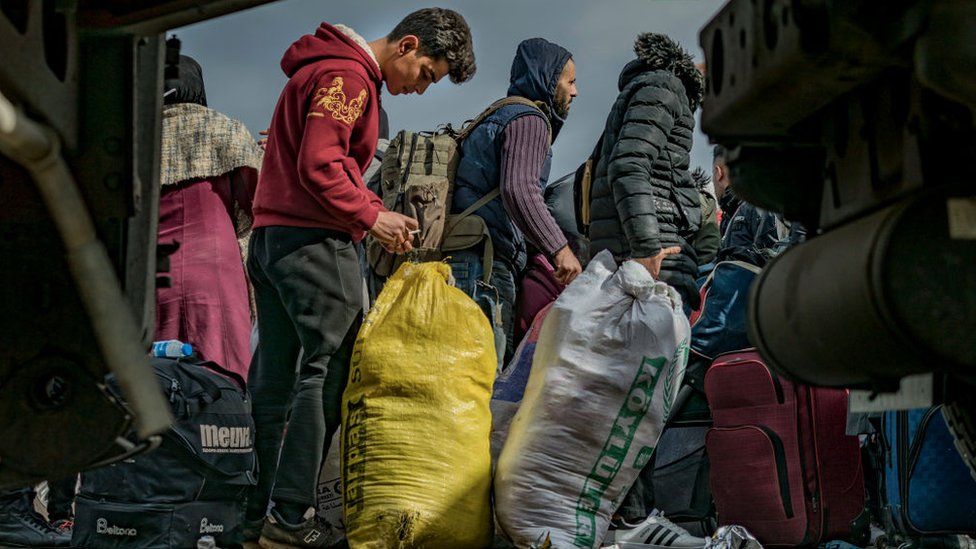Türkiye elections: Erdogan, Kilicdaroglu offer stark choices for presidency PHOTO
Turks are at a historic turning point - choosing between two front-runners for the presidency offering dramatically different paths for their country's future.
After more than 20 years in power, Recep Tayyip Erdogan promises a strong, multilateral Türkiye and the creation of six million jobs, and accuses the West of trying to bring him down, according to BBC.
His chief rival, Kemal Kilicdaroglu, backed by a broad opposition, wants to steer this Nato member state back towards a pro-Western, more democratic stance.
The president accuses his opponents of being "pro-LGBT", while his Islamist-rooted party positions itself as on the side of the family.
Big moment for Turkish rule
Since 2017, Mr Erdogan has run Türkiye with sweeping presidential powers, from a vast palace in Ankara. As executive president, he can declare a state of emergency and can pick or dismiss civil servants.
If he wins, not much will change, says Selim Koru, a member of Türkiye's Tepav think tank. His powers are already so broad he won't seek to extend them further, he says.
But the man seeking to replace him wants to scrap the presidential system and become an "impartial" leader, with no connection to a political party.
Mr Kilicdaroglu says he would roll Türkiye back to having parliament and a prime minister in charge, and revive independent courts and a free press. "I will serve all 85 million citizens of Türkiye. I will show respect for each of you," he has promised.

President Erdogan acquired sweeping executive powers in the aftermath of the botched coup against him in 2016
The other five parties in his alliance would each have a vice president, as would his party colleagues who are mayors of Ankara and Istanbul.
Before they do scrap the powerful presidency, they might need to use its powers to force through the reforms if they do not have sufficient control of parliament.
Parliamentary and presidential elections will both be taking place on 14 May.
Looking East or West
Türkiye is part of the West's Nato defensive alliance, but the Erdogan presidency has sought close ties with China and Russia too, buying a Russian S-400 air defence system and inaugurating a Russian-built nuclear plant - Türkiye's first - ahead of the election.
He advocates a multilateral stance, viewing Türkiye as "an island of peace and security", and offering Ankara as a mediator in the Russian war in Ukraine.
His opponent and his allies, meanwhile, want to return to the process of joining the European Union and restore Türkiye's military ties with the US, while maintaining relations with Russia.
If Mr Erdogan stays in power then Selim Koru believes he will continue to push Türkiye away from the West, without leaving Nato. "He wants to get Türkiye to a point in the medium term or distant future where Nato membership is irrelevant."
High inflation or orthodox economics?
This is a crunch moment for Türkiye's economy too. Inflation is officially 43.68%, and Turks have had a cost of living crisis far more severe than most. Many will tell you the real inflation rate feels far higher.
The early Erdogan years were a byword for strong economic growth and enormous construction projects. And Türkiye always stuck closely to the terms of its loan agreements with the IMF.
But in recent years his government has abandoned orthodox economic policy. It gradually eroded the independence of the central bank, says Selva Demiralp, professor of economics at Koc University, sacking three of its governors in quick succession.
Inflation soared, as interest rates were kept low - while Türkiye's currency the lira depreciated to improve the trade balance and boost exports.

Official inflation rates have fallen to 44% but Turks say the real inflation rate in shops and markets feels higher
Mr Erdogan still promises high growth, six million new jobs and a big push for tourism, but Prof Demiralp believes his policies will keep inflation as high as 45% for months to come.
If Kemal Kilicdaroglu and his allies win the presidency and parliament, she believes a return to orthodox economic policies and an independent central bank will lower inflation to 30% by the end of 2023 and it will continue to go down after that.
Even if it means higher interest rates, Prof Demiralp believes Türkiye could enjoy strong growth from foreign investment: "At the moment Türkiye is rather cheap and its location, young population and the infrastructure offer mutually beneficial investment opportunities for international investors."
Fears of Syrian refugees
This election is being watched very carefully by 3.5 million Syrian refugees who have temporary protection in Türkiye, as the opposition challenger wants to send them home "within two years at the latest".
That's a major worry for Syrians, who came here mainly in the first six years of the war until 2017.
More than than 80% of Turks want them to go home, and after the economy and the aftermath of the earthquake it is the most important issue for Turks, says Prof Murat Erdogan, who conducts a regular Syrians Barometer.
And yet more than 700,000 Syrians are in Turkish schools and 880,000 Syrian babies have been born in Türkiye since 2011. "I cannot understand how they would leave this life and go back to Syria," says Prof Erdogan.
Kemal Kilicdaroglu says he will negotiate the Syrians' return with Damascus, but as Syria insists on Türkiye leaving its 30km (18-mile) buffer zone over the border, that runs the risk of Syria launching attacks on the zone and sparking a new wave of refugees.

Türkiye's government says more than half a million Syrian refugees have returned home, but the opposition wants more to leave
The opposition leader knows full well an agreement would take up to two years, and he would ask the United Nations to oversee it. But Murat Erdogan believes it could take a decade to implement.
President Erdogan has sought to defuse the issue, by promising to speed up the voluntary repatriation of a million Syrians through an agreement with President Bashar al-Assad. But the idea of Syrians returning voluntarily seems far-fetched.
Kurdish kingmakers
There is a lot at stake in this election for Türkiye's Kurds, who make up as much as a fifth of Türkiye's 85 million people.
Up to one in 10 voters back the pro-Kurdish HDP, who are the second biggest opposition party. They have publicly backed Kemal Kilicdaroglu for president and see the vote as "the most crucial elections in Türkiye's history".
Kurdish voters initially backed the Erdogan government's policies as their rights were improved in the first decade of his rule. But that turned sour in 2015, when peace talks broke down on ending a decades-long insurgency by the Kurdish militant PKK, seen by Türkiye and its Western allies as a terrorist group.
President Erdogan accuses Mr Kilicdaroglu of surrendering to the "blackmail" and agenda of the HDP and militants. "My nation will not hand this country over to a president who got support from Qandil," he warned, raising the stakes still higher by referring to the militants' headquarters in northern Iraq.
The opposition challenger has openly courted Türkiye's Kurdish population, millions of whom he says are "treated as terrorists on a daily basis" and are stigmatised by a government looking for the nationalist vote.
The pro-Kurdish party vehemently denies government allegations of being a "political wing" for the militants. It is standing under an umbrella Green Left movement in case the government seeks to bar its candidates.








